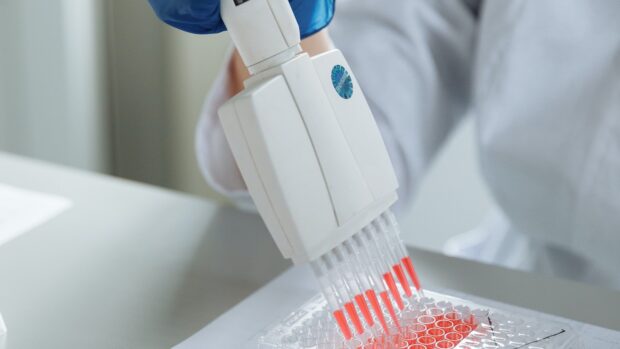An AI medical firm is revolutionizing the creation of antibodies through the use of machine learning. LabGenius’s innovative system quickly combines numerous options to generate a handful of potential samples that could be highly effective. By avoiding traditional human practices, the model produces results that were previously unimaginable. Artificial intelligence extends beyond popular applications like ChatGPT and media-generating tools. In the field of medicine, AI plays a crucial role in developing new treatments and medications. In the near future, you might find yourself thanking AI for your next prescribed drug or medical procedure. This article will delve into the process of creating AI antibodies using LabGenius as an example. Additionally, we will explore other notable projects within the medical field that utilize artificial intelligence, such as Google’s medical chatbot. But first, let’s understand why AI is being used to create antibodies.
Antibodies are proteins within the immune system that attach to bacteria, viruses, and other antigens, enabling the body to eliminate them and maintain good health. Synthetic antibodies have been created by pharmaceutical companies since the 1980s to treat diseases like cancer and aid in the acceptance of transplanted organs. However, this process is time-consuming, requiring protein designers to sift through millions of potential combinations of amino acids. They then undergo testing and adjustments until they find an effective result. According to LabGenius founder and CEO James Field, the molecule you’re looking for could be anywhere within an infinite space of potential molecules. To address this challenge, LabGenius developed a machine learning model that can rapidly produce an antibody from millions of possible combinations. This innovation has significantly accelerated antibody development compared to manual human efforts. The only input required from humans is to provide the model with examples of healthy and diseased cells. The system then explores different antibody designs that can accurately differentiate between the two.
LabGenius’s AI program generates over 700 initial options from a pool of 100,000 potential antibodies. These options are designed, built, and tested automatically, while human oversight ensures the smooth transfer of samples between different machines. The model learns from experimental results, continuously improving the chances of producing better outcomes. Human protein designers, on the other hand, face the daunting task of determining the optimal combination of attributes to maximize benefits and minimize risks. This process slows down their progress significantly, and their limited testing capabilities often lead to the adoption of common practices that hinder new discoveries.
LabGenius is not the only AI application in the healthcare industry. Google is currently developing a medical chatbot for hospitals, which initial tests have shown to outperform doctors in reasoning and providing consensus-supported answers. However, further research and development are necessary before it can be widely implemented. McMaster University and the Massachusetts Institute of Technology have also developed an AI model similar to LabGenius, but for the treatment of Acinetobacter baumannii, a superbug commonly found in hospitals. By testing thousands of medicines with known chemical structures, they were able to identify compounds that could slow down or eliminate the superbug. A shortlist of 240 potential candidates was narrowed down to nine, with abaucin emerging as the most promising option. This compound has shown effective results in treating infected wounds in mice and killing samples from infected patients. However, refining the medicine in the laboratory and conducting clinical trials are crucial next steps, with an estimated completion date of 2030.
In conclusion, LabGenius’s machine learning model has revolutionized the process of developing synthetic antibodies, potentially paving the way for the creation of drugs for previously untreatable diseases. James Field believes that this innovation could transform medical research by identifying molecules that would be impossible to find using traditional methods. These molecules often possess unique and counterintuitive designs that human experts may overlook, ultimately leading to improved patient outcomes.
Denial of responsibility! VigourTimes is an automatic aggregator of Global media. In each content, the hyperlink to the primary source is specified. All trademarks belong to their rightful owners, and all materials to their authors. For any complaint, please reach us at – [email protected]. We will take necessary action within 24 hours.


